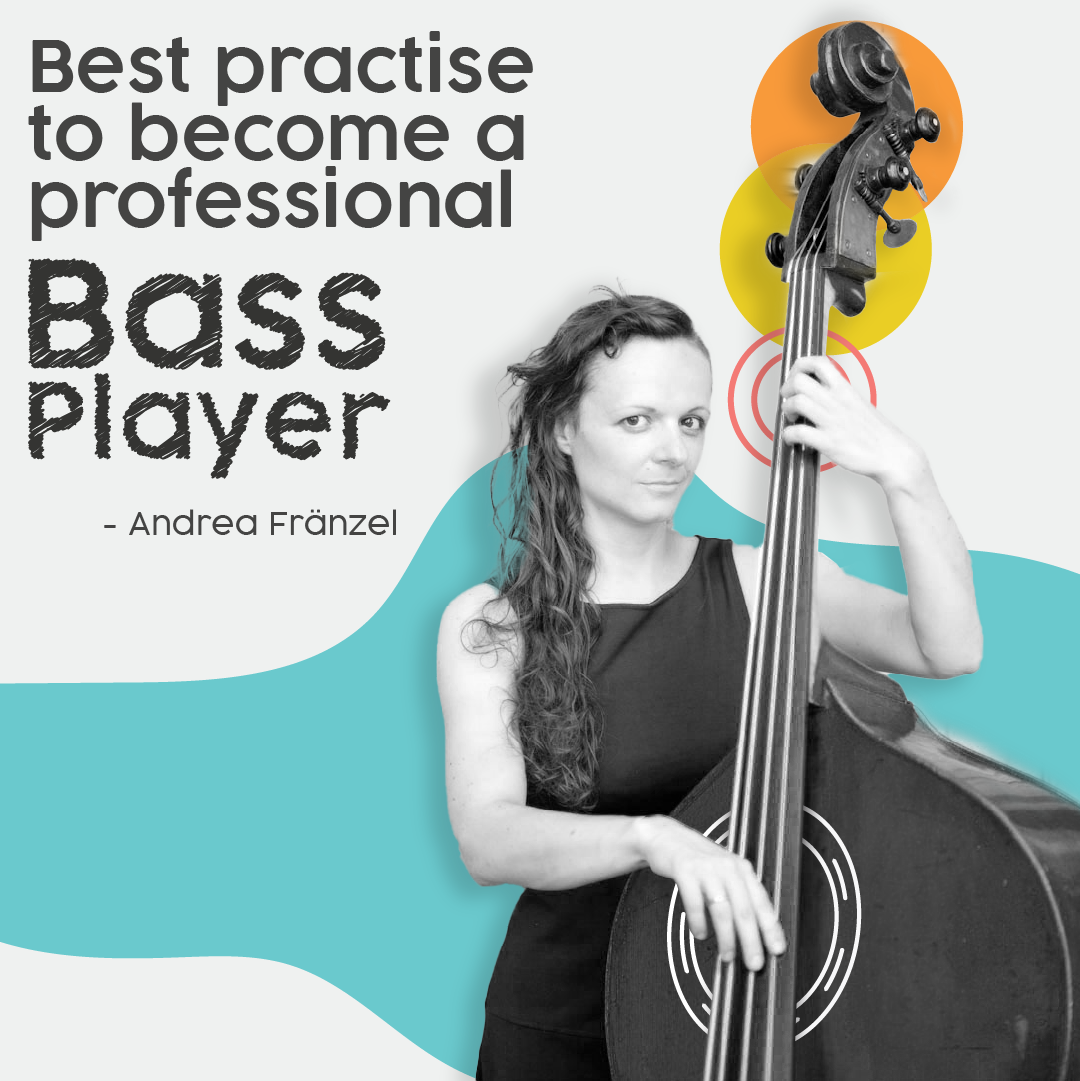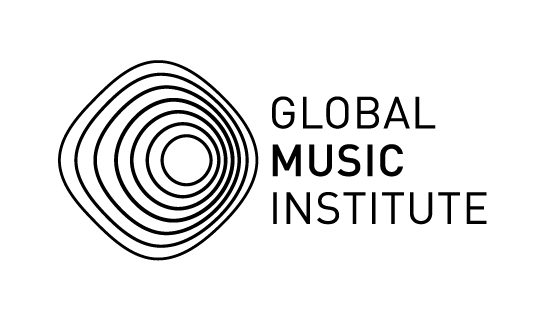
13 Oct Best Practise to Become a Professional Bass Player – Andrea Fraenzel
Hello everyone!
My name is Andrea Fraenzel. I am a professional bass player from Austria in Europe. For a while, I was teaching on campus and online at GMI. Being a professional musician myself, I know that pursuing a career in music is often accompanied by lots of questions and uncertainties.
When I was a teenager, I learned classical guitar at a music school and played bass in indie bands. After school I opted to undertake music education – motivated by my wish to continue music in general and have a professional qualification as a teacher.
It was another step for me to decide to study bass and become a professional bass player about four years later. It seemed a logical continuation and professionalization after playing in several bands and having regular gigs.
I’d like to share with you some thoughts that might have sped up my decision-making process at the time. I wrote it for prospective bass players but I think a lot of it applies to all musicians.
Scott’s bass lessons: https://www.youtube.com/user/devinebass
So what do you need to become a better and professional bass player?
Skills on the instrument
No surprise! First and foremost you need to be able to play your instrument as well as possible. Given the many incredible bass players in the world, this might be intimidating but just be patient, you’ll get there too. Think of it that way: nobody can stop you from learning and improving.
Once you know the notes on the fretboard and have a decent left and right-hand technique, the most important aspects of your playing are timing and groove. Timing means to play rhythmically accurately and lock in with the pulse of the music and the other players. Groove is harder to describe. You feel it when it’s there and even more so when it’s lacking. In my opinion, groove is what makes your head bounce to the music. It is a combination of phrasing, articulation and of course good timing. Equally important is how your part fits with everybody else’s part. This leads to the next point that is essential: creating bass parts according to the style of music of the piece you are playing. In order to do that you need to know a lot of music and analyze the bass parts. For example, in pop/rock music styles the bass often plays a rhythmic pattern of the root note of the chord.
In jazz a lot of times you play what is called a two feel (meaning half notes) and walking bass lines (meaning lines in quarter notes that connect the root notes of the chords). A style with great bass lines is Motown, a rhythm and blues influenced style from the 1960s with the iconic bass player James Jamerson. Of course the very popular Progressive Rock in India with its elaborate forms and frequent changes of time signatures is also a great source for challenging bass parts.
Whatever music you’d like to play: proficiency in music theory gives you the knowledge on which notes to use when creating your parts and also makes you understand music better overall.
To read or not to read, that’s the question… I experienced that music students in India are excellent at learning music by ear and remember even difficult and complicated tunes very well. However, reading music is an essential skill and at some point in your professional career, you will need to be able to read well. The good thing: it’s not rocket science; it only needs patience and practice (as with most things).
I mentioned before that you should analyse bass parts from songs. You can do that by ear but in my own experience when I tried to write it down in notation (aka transcribe it) I was more precise and therefore got more accurate results.
Last but not least, tone and sound contribute a good deal to your playing. My general approach is to use basses and amplifiers where I already like the flat unaltered sound and then experiment with the EQ, mainly with high and low mids. (I am usually cutting both a little bit but it depends of course on the style and the particular project.)
Now all of this is, of course, easier said than done and although we might have a good idea in our head it is a challenge to break it down into precise and practical exercises and follow them through. There are examples of great self-taught musicians but if you can, I’d strongly recommend getting lessons with a teacher who helps you with that.
Andrea Fraenzel bass reel: https://www.youtube.com/watch?v=TURFWtahUjsn
Get a band or two or three
The bass is not a solo instrument – its main function is to connect harmony and rhythm and accompany the melody. And that’s what makes this instrument great: it is needed in almost every style of music. Whether you start as a bass player or are about to become professional I’d recommend getting as much experience playing in bands and ensembles as possible. With time you will find out which genre or style you like best or suits you best. Or you may have a project that is going really well and needs a lot of your time and then of course it makes sense to focus on it. Being in a band is also a great school of life because there is a lot to learn other than playing your instrument. This leads to my next point:
Listening
“99% of all problems in music could be solved by listening.” I don’t remember where I heard this first but I fully agree with it. (And maybe would even say that it actually applies to all other areas as well because listening creates understanding which creates better solutions.)
Listen to music, listen to yourself, and when playing with others listen to them.
When you practice, listen to yourself and focus on a specific aspect of your playing at a time: timing, phrasing, and articulation. This keeps you attentive and you can concentrate for longer periods of time.
When playing with others listen to the others: can you hear the parts they are playing? And then can you hear how your playing fits into theirs? I’d like to rephrase a sentence from above: Listening creates a connection, which creates understanding, which creates better musical choices!
Networking
Playing music together can be a really emotional experience and in addition to everything mentioned above, an open and agreeable personality helps in creating a vibe together. Or as a colleague once bluntly put it: “I thought people will call because you play well. I was wrong, they call because you’re nice.” I’d say you need both musical and social skills, to build and expand your network.
There are some famous examples like the band “Queen” that managed to channel their conflicts with each other into creative expression but I’d say that this is rarely the basis of a successful career either as a group or as an individual.
Of course, nobody is perfect and we all make mistakes. However, simple things like answering your phone and messages, being on time, and being prepared make working with you easy. Bandleaders and organizers have a million things on their minds and your reliability will be highly appreciated.
By the way, with all the messenger services available I still believe a phone call is a very quick and effective way to communicate and get to know the person on the other end of the line at the same time.
The benefits of attending a music college lie not only in developing your skills and in gaining knowledge but you will also meet many aspiring musicians with whom you will work in the future.
In this day and age, it’s needless to say that an online and/or social media profile is also important to get out information about you and promote your projects.
Motivation
Now I’ve written a lot about what to do but there is one important question still missing that I’d recommend you think about: It is not only important how to become a musician but also why?
What drives you to dedicate your life to music and not to something else?
Which rewards would you like to get from it?
Personally, I wasn’t sure whether music was the thing that I could do best or that was promising the most success in life. However, I was absolutely sure that it would challenge me and force me to grow more than any other occupation would.
Coming to a close on my two cents about becoming a professional musician I’d like to mention a funny story that renowned Austrian double bass player Peter Herbert once told me. It’s the following advice he once got from an experienced musician.
“The first 10 years you learn how to play your instrument, the second 10 years you learn how to play with others, the third 10 years you learn how the music business works, the forth 10 years you find your language – and then things get really awesome.”
Well, so far, I agree! And I’d love to hear your thoughts and questions on this article and topic!
Written by Andrea Fraenzel
For more on practice tips and performance psychology, read here.
You can follow Andrea on Facebook and Instagram.
Bio:
Andrea Fraenzel was born and grew up in Gmunden, Upper Austria.
She was awarded first prize in upper Austria’s young musician competition “ Prima la musica“ in the category of classical guitar solo performance in 1998.
She studied classical guitar and bass at the University of Music and Performing Arts Vienna and took private lessons with Peter Herbert and Juan Garcia-Herreros. Playing both acoustic and electric bass, she is a versatile artist and has worked with artists of almost every genre: pop, soul, rock, singer/songwriter, jazz, improvised music, world music, and classical music.
Andrea is the first musician from Austria who was accepted into the Contemporary Performance Master’s Program of the Berklee College of Music – Valencia Campus from which she graduated summa cum laude in July 2014 and was honored with the “Outstanding Scholar Award”.
In 2018 and 2020 she taught at Global Music Institute (GMI) in India as bass faculty. Since the outbreak of the Coronavirus pandemic, she regularly teaches online courses for GMI.



No Comments